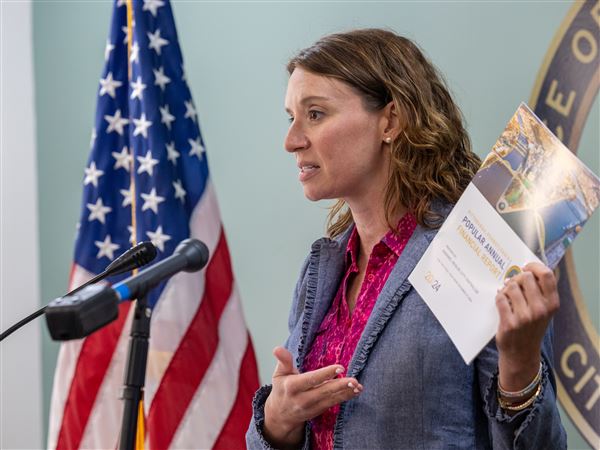Army Spc. Joseph Darby's decision to report the abuses at Abu Ghraib to his commanding officer powerfully affirms what playwright Arthur Miller meant when he wrote that "as improbable as it may seem, sometimes an individual conscience is all that keeps a world from falling."
If there is anything positive to be salvaged from the shattering disillusionment that is Abu Ghraib, it is that the next generation of leaders will learn that individual acts of conscience can ultimately prevail over systematic abuse, repression, discrimination and entrenched power structures even those as seemingly impenetrable as the Defense Department's.
By sounding the alarm, Darby triggered an avalanche of consequences including: congressional hearings, presidential statements, far-reaching changes in U.S. policy toward the interrogation of detainees, widespread political ramifications reaching from the Arab world to Prime Minister Tony Blair's re-election prospects, and possibly a decisive shift in public opinion about the war.
Darby's actions embody one of history's most unassailable lessons: Individual acts of conscience often create more sweeping change than the official acts of large institutions. There are moments when those with the least power, wealth, privilege or rank, those who may be feeling more alone than they've ever felt in their lifetime, can have a greater impact than could possibly be imagined.
History is replete with examples ranging from the legacies of icons like Gandhi and Martin Luther King Jr., to other actions large and small:
 When Herbert Carter refused to obey Lt. William Calley's order to shoot defenseless Vietnamese villagers at My Lai, he prevented additional carnage, and his subsequent testimony about the atrocities led to the conviction of Calley and widespread reform.
When Herbert Carter refused to obey Lt. William Calley's order to shoot defenseless Vietnamese villagers at My Lai, he prevented additional carnage, and his subsequent testimony about the atrocities led to the conviction of Calley and widespread reform.
 When in 1942, Jan Karski, a 28-year-old diplomat for the Polish government in exile, crawled through a tunnel into the Warsaw Ghetto to see for himself the plight of hungry and dying Jews, and then crossed the Atlantic to inform President Franklin Roosevelt, it was a first step toward ending the Holocaust.
When in 1942, Jan Karski, a 28-year-old diplomat for the Polish government in exile, crawled through a tunnel into the Warsaw Ghetto to see for himself the plight of hungry and dying Jews, and then crossed the Atlantic to inform President Franklin Roosevelt, it was a first step toward ending the Holocaust.
 When Pee Wee Reese, disgusted by the vulgarity of racist baseball fans, walked over to second base to comfort Jackie Robinson with a hand on his shoulder, Robinson's transition into the major leagues was substantially eased by that solitary and gentle act.
When Pee Wee Reese, disgusted by the vulgarity of racist baseball fans, walked over to second base to comfort Jackie Robinson with a hand on his shoulder, Robinson's transition into the major leagues was substantially eased by that solitary and gentle act.
 When Oseola McCarty, a washerwoman from Mississippi, donated $150,000 of her hard-earned savings for a scholarship fund at the university, Ted Turner was inspired to pledge $1 billion to the United Nations, saying, "If that little woman can give away everything she has, then I can give a billion."
When Oseola McCarty, a washerwoman from Mississippi, donated $150,000 of her hard-earned savings for a scholarship fund at the university, Ted Turner was inspired to pledge $1 billion to the United Nations, saying, "If that little woman can give away everything she has, then I can give a billion."
We tend to think that creating change requires an array of external resources and support: acts of Congress, great sums of money, large standing armies, technology, vast research capabilities, or powerful lobbyists, relationships, and networks. Of course, all have their place. But often the most sweeping change results from a single individual with none of those at his or her command, but instead with the courage to follow his or her conscience.
That acts of conscience have power is not a new idea. But because abiding one's conscience often puts friendships, popularity, career and possibly even one's liberty at risk, each generation must discover anew the faith that acting upon conscience requires. It is the faith upon which all social change is conceived, the bedrock of every effort to serve country and community. It is what keeps a soldier in his platoon and a Peace Corps volunteer in her village when the odds of success or even survival seem slim. It is the impulse that holds the doctor to the O.R. and the teacher to the classroom. It is the essence of the American character.
Years from now, Joseph Darby may only be a footnote in the telling of even greater events that have yet to unfold. But he has forever reshaped the history of our time and not one of us has been left untouched by his act of conscience.
First Published: May 22, 2004, 4:00 a.m.













